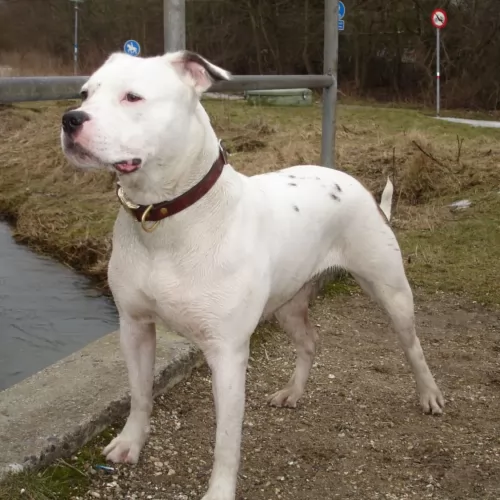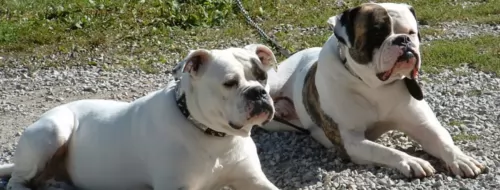 Petzlover
Petzlover Antebellum Bulldog is originated from United States but Briard is originated from France. Both Antebellum Bulldog and Briard are having almost same height. Antebellum Bulldog may weigh 28 kg / 62 pounds more than Briard. Antebellum Bulldog may live 3 years more than Briard. Both Antebellum Bulldog and Briard has almost same litter size. Antebellum Bulldog requires Low Maintenance. But Briard requires High Maintenance
Antebellum Bulldog is originated from United States but Briard is originated from France. Both Antebellum Bulldog and Briard are having almost same height. Antebellum Bulldog may weigh 28 kg / 62 pounds more than Briard. Antebellum Bulldog may live 3 years more than Briard. Both Antebellum Bulldog and Briard has almost same litter size. Antebellum Bulldog requires Low Maintenance. But Briard requires High Maintenance
 The history of the Antebellum Bulldog dates back the 1600s where it was used as a lasting solution to drive away hogs in rice plantation farms in Altamaha River in Georgia. After the plantation system became dominant in most parts of the United States, a majority of the farmers had to think of a more creative way of driving away wild feral pigs and cattle. Having caused multiple deaths to humans due to their massive bodies and extremely sharp horns, farm owners had no option but to employ bulldogs as the only means of security.
The history of the Antebellum Bulldog dates back the 1600s where it was used as a lasting solution to drive away hogs in rice plantation farms in Altamaha River in Georgia. After the plantation system became dominant in most parts of the United States, a majority of the farmers had to think of a more creative way of driving away wild feral pigs and cattle. Having caused multiple deaths to humans due to their massive bodies and extremely sharp horns, farm owners had no option but to employ bulldogs as the only means of security.
Although these dogs served their purpose of protecting their masters while still being family companions, their age of extinction came during the Civil War where the economy at the Altamaha region was permanently altered. After the fall of plantation farming and abolition of slavery, the Antebellum Bulldog became a forgotten breed something which led to its extinction. However, as years passed by, this rare breed was eventually reintroduced by the Maxwell family under strict guidelines by the Animal Research Foundation.
 Through myth and legend, the Briard is thought to be a very ancient dog. A French herding breed, a Briard type of dog appears in writings as early as the end of the 14th century. According to legends the Briard was owned by Napoleon, Charlemagne, Lafayette and Thomas Jefferson. As a cross between the Barbet and the Beauceron, the Briard came into popularity following its appearance in a Paris dog show in 1863. Bred originally to guard and herd sheep, these intelligent, independent dogs were often left on their own. Because they both guarded and herded, their size and structure as well as their personalities were different from other dogs that worked sheep. Those that herded only were fast, agile and smaller. Those that only guarded were heavier, bigger and stronger. The Briard was in-between these two types of breeds. He was well suited to any kind of farm work and guarded the crops from the sheep’s desire to eat them. They moved the sheep from one grazing area to another and then to their holding area at night. No humans had to assist the Briard in this work once they were trained.
Through myth and legend, the Briard is thought to be a very ancient dog. A French herding breed, a Briard type of dog appears in writings as early as the end of the 14th century. According to legends the Briard was owned by Napoleon, Charlemagne, Lafayette and Thomas Jefferson. As a cross between the Barbet and the Beauceron, the Briard came into popularity following its appearance in a Paris dog show in 1863. Bred originally to guard and herd sheep, these intelligent, independent dogs were often left on their own. Because they both guarded and herded, their size and structure as well as their personalities were different from other dogs that worked sheep. Those that herded only were fast, agile and smaller. Those that only guarded were heavier, bigger and stronger. The Briard was in-between these two types of breeds. He was well suited to any kind of farm work and guarded the crops from the sheep’s desire to eat them. They moved the sheep from one grazing area to another and then to their holding area at night. No humans had to assist the Briard in this work once they were trained.
During World War 1, the Briards were drafted into service as messengers, sentries and search dogs for lost or injured soldiers. In that time frame the breed served almost to the point of extinction. Breeding programs following the war brought them back. Today the Briard is a home companion, a police dog, as well as both military and civilian search and rescue dogs.
 The Antebellum Bulldog is a recently introduced breed that was developed with an aim of recreating the historic working bulldog or Southern breed. First introduced in the United States, this bulldog was initially bred to be used as a working dog in rice plantations in Altamaha River Valley, a region in South East Georgia.
The Antebellum Bulldog is a recently introduced breed that was developed with an aim of recreating the historic working bulldog or Southern breed. First introduced in the United States, this bulldog was initially bred to be used as a working dog in rice plantations in Altamaha River Valley, a region in South East Georgia.
By nature, the Antebellum Bulldog is an extremely loving, loyal, affectionate, and very intelligent pet. Due to that reason, this breed is a perfect choice for a family dog. If we can get back to history, it’s evident that this dog breed was used in plantation farms to secure the rice from damages caused by cattle and wild hogs. Relating these tasks to the dog’s overall personality, you will find that indeed the Antebellum Bulldog is one such breed that can be trusted as a watchdog in today’s homes.
The Antebellum Bulldog is very similar to the American Bulldog only that it’s a little bit larger and bulkier with a proportionally bigger head. These breeds usually range from bigger to biggest with males weighing around 36 to 68 Kg (80—150 pounds) and females 32 to 50 Kg (70—110 pounds). Similar to the American Bulldog, the Antebellum Bulldog has a rough coat, long legs, an athletic body and short tail/ears that don’t require any cropping.
Despite of their intimidating appearance, the Antebellum Bulldog is an extremely loving, passionate, and loyal pet that will suit perfectly as a family dog. These dogs will lie down to their masters and will need nothing more than constant company. According to professional breeders, the Antebellum Bulldog is most likely to form a close attachment to one member of the family although they still do enjoy hanging out with the rest of the family members.
As it is the case with most American Bulldogs, the Antebellum Bulldog has a very strong protective instinct that makes it react violently when strangers step into its territories. Something else you need to know about this Bulldog breed is that it does get along well with kids to a point of being overprotective. Since puppies are usually over playful, adults are highly advised to watch out as they can accidentally bowl or knock over your toddler.
The Antebellum Bulldog doesn’t have to be professionally groomed as is the case with most dog breeds. Apart from a weekly brushing of the coat, the other grooming needs you’re supposed to observe include; regular brushing of the teeth and trimming of nails from an early stage.
 The Briard is a powerful, intelligent and independent working dog. They have a straight topline and their height is almost the same as their length. They have long, large, rectangular heads with wide muzzles. Their noses are also square and jet black while their side set, large eyes can be black-brown or black. Their ears have traditionally been cropped but with more countries outlawing it, they can now have natural ears set high on the head. They have a tail that is feathered and low-cut. The feet of a Briard are round, compact and large.
The Briard is a powerful, intelligent and independent working dog. They have a straight topline and their height is almost the same as their length. They have long, large, rectangular heads with wide muzzles. Their noses are also square and jet black while their side set, large eyes can be black-brown or black. Their ears have traditionally been cropped but with more countries outlawing it, they can now have natural ears set high on the head. They have a tail that is feathered and low-cut. The feet of a Briard are round, compact and large.
The Briard is a double coated breed with a long beard and mustache. Their hair completely covers the head and the eyes so that they are not seen. They have prominent eyebrows as well.
 Although the Antebellum Bulldog is quite intimidating, this dog can make a great pet thanks to its loving, patient, and extremely tolerant characteristics. This dog enjoys playing with young children as well as other members of the family although proper care should be observed to avoid injuring young toddlers due to their muscular bodies.
Although the Antebellum Bulldog is quite intimidating, this dog can make a great pet thanks to its loving, patient, and extremely tolerant characteristics. This dog enjoys playing with young children as well as other members of the family although proper care should be observed to avoid injuring young toddlers due to their muscular bodies.
The Antebellum Bulldog is a protective dog breed with very strong guarding instincts. New visitors will have to be very careful as these dog breeds are quite wary of strangers and will not treat them politely. However, if you become familiar with them, they are likely to know you and later accept you as part of a large family.
Speaking of adaptability, the Antebellum Bulldog is more of a working dog than a household pet. Although some people will prefer to keep them indoors, always ensure that your homestead has a backyard where they can exercise. Otherwise, these dog breed will prefer to be kept in rural areas where there are vast tracks of land for them to play on.
Finally, the Antebellum Bulldog is an intelligent dog with a very sharp memory. However, due to their extremely playful nature, they can become very stubborn and messy. Therefore, owners are advised to train them early enough before they are fully grown.
 As mentioned previously the Briard is intelligent and independent. They are also loyal, rugged, protective and bond intensely with their humans. They are often aloof when it comes to strangers or even when new furniture is introduced into the household. They have to learn that anything new into the family environment is friendly and good. They are great with children and susceptible to separation anxiety because of their deep affection for their people. Socialization for puppies is a must. This will let them know that people and children, other dogs in general are not harmful to their families. They have great memories and once they learn something – right or wrong – it is almost impossible to change it. They were bred to be independent thinkers who acted on their own conclusions. This is still true of the breed today, making them appear to be stubborn.
As mentioned previously the Briard is intelligent and independent. They are also loyal, rugged, protective and bond intensely with their humans. They are often aloof when it comes to strangers or even when new furniture is introduced into the household. They have to learn that anything new into the family environment is friendly and good. They are great with children and susceptible to separation anxiety because of their deep affection for their people. Socialization for puppies is a must. This will let them know that people and children, other dogs in general are not harmful to their families. They have great memories and once they learn something – right or wrong – it is almost impossible to change it. They were bred to be independent thinkers who acted on their own conclusions. This is still true of the breed today, making them appear to be stubborn.
They are great watchdogs, fearless and brave; willing to learn, eager to make you happy. They are basically gentle but that always runs up against their protective nature. A strong alpha leader is needed to handle this hard-working dog.
 The Antebellum Bulldog has a life expectancy of 12—15 years. Recognized as an emerging breed, this dog doesn’t have many health problems as compared to most other dog breeds. Although these dogs are muscular and very athletic, these breeds suffer from various health conditions which are caused by the nature of their coat. Among the common health problems of the Antebellum Bulldog include
The Antebellum Bulldog has a life expectancy of 12—15 years. Recognized as an emerging breed, this dog doesn’t have many health problems as compared to most other dog breeds. Although these dogs are muscular and very athletic, these breeds suffer from various health conditions which are caused by the nature of their coat. Among the common health problems of the Antebellum Bulldog include
One major health problem that affects blue-eyed dog breeds (such as this one) is possible blindness. This condition is usually caused by diabetes, hypertension or Cushing’s syndrome. To treat this condition, you need to take your dog for regular veterinary checkups to know the root cause of the problem.
Another health problem that is very familiar with most Antebellum Bulldogs is hip dysplasia. Since these dog breeds are usually muscular and very huge, this condition is most likely to affect them, especially at an early stage. Dog owners should, therefore, be very familiar with this condition and should take their pets for regular veterinary tests to avoid it.
 Being a large breed, the Briard shares many of the same health concerns as other large breeds. They have a few of their own as well. Typical issues for a Briard might include:
Being a large breed, the Briard shares many of the same health concerns as other large breeds. They have a few of their own as well. Typical issues for a Briard might include:
Progressive Retinal Atrophy/Degeneration –degeneration of the photoreceptors and retina.
 Feeding an Antebellum Bulldog is much similar to feeding other dogs. Owners are highly advised to stick to high-quality hypoallergenic diets that are rich in vitamins and nutrients. Now, since Antebellum Bulldog puppies are usually playful, feeding them with high nutrient food thrice a day will really help. Always avoid feeding your puppies with processed foods or foods with artificial sugars as they can expose the puppies to severe health problems.
Feeding an Antebellum Bulldog is much similar to feeding other dogs. Owners are highly advised to stick to high-quality hypoallergenic diets that are rich in vitamins and nutrients. Now, since Antebellum Bulldog puppies are usually playful, feeding them with high nutrient food thrice a day will really help. Always avoid feeding your puppies with processed foods or foods with artificial sugars as they can expose the puppies to severe health problems.
When feeding senior Antebellum Bulldog, there are some small changes you’ll need to make. First, these dogs will require high-quality foods that are easy to digest. Wet foods are perfect for Antebellum Bulldogs as they will help to keep them hydrated. Buy dog foods low in calories and rich in essential vitamins and nutrients to match your dog’s energy.
Antebellum Bulldog can add extra weight if proper care is not observed when feeding them. Due to this reason, these dogs should be fed depending on their level of activity to avoid cases of obesity.
Since their ancestors were used to guard rice plantations in Altamaha, Antebellum Bulldogs are very energetic and highly suited in rural settings over indoor lifestyle. However, if you decide to keep these dogs as pets in your households, it’s advisable that you provide them with some playing space in the backyard.
When it comes to training the Antebellum Bulldog, owners are advised to train them to be obedient at an early stage as they can get really stubborn in the future. These dogs are very intelligent and they never forget what they learn once they’ve mastered it.
 It is best to feed the Briard smaller meals 2-3 times a day to prevent bloat. Feed 3-4 cups total for the day of a dry dog food that is high quality and made for large breeds.
It is best to feed the Briard smaller meals 2-3 times a day to prevent bloat. Feed 3-4 cups total for the day of a dry dog food that is high quality and made for large breeds.
Stationary Night Blindness – Congenital limited vision in the dark can vary from slight difficulty moving to complete inability to see in the dark.
Progressive Retinal Atrophy/Degeneration – Can lead to night blindness, limited or total blindness. Puppies with the disease can be blind before their first birthday.
Bloat (Gastric Torsion) – Stomach is distended and twists. Fatal if not treated quickly. Caused by eating a large meal quickly and either exercise immediately or drink a large amount of water right after eating.
Von Willebrand’s Disease – Blood clotting disorder leads to excessive bleeding. There is no cure, but it is manageable.
The Briard is a working dog and as such needs a job. They excel at agility, flyball, herding, obedience, confirmation and tracking. They need exercise and make excellent service dogs for people with disabilities and therapy dogs for those in emotional need.